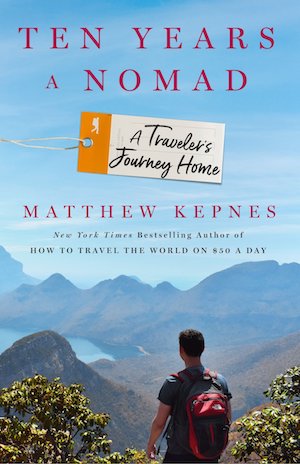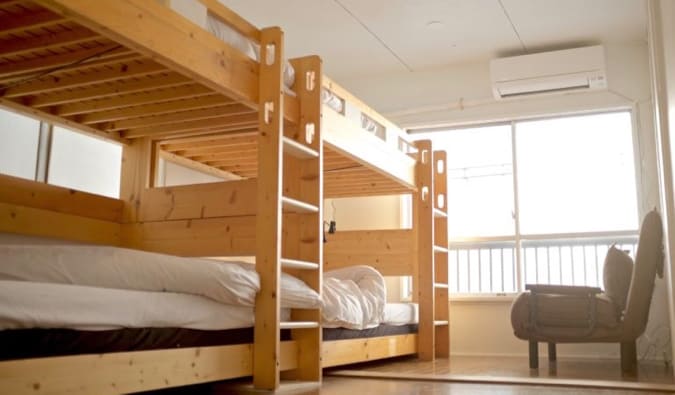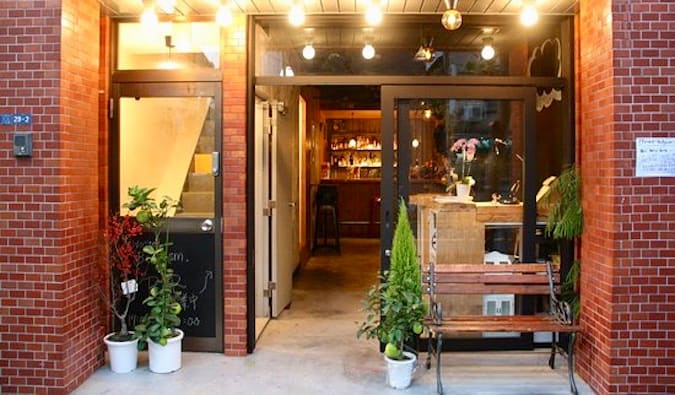
Posted: 5/28/2019 | May 28th, 2019
Though I’ve alluded to it for months, it’s time to finally let the cat fully out of the bag:
I’m releasing a brand-new book!!!!
It took close to two years to write (and was the hardest thing I ever wrote). But, after a million edits, it’s done and ready for the world.
It’s called Ten Years a Nomad: A Traveler’s Journey Home.
And it comes out July 16th!
This isn’t another “how-to” money-saving guidebook.
 The memoir is about my ten years traveling around the world, the lessons I learned, and my advice on being a better traveler. It features stories I’ve never told and goes deeper into my philosophy on travel than I ever have on this blog.
The memoir is about my ten years traveling around the world, the lessons I learned, and my advice on being a better traveler. It features stories I’ve never told and goes deeper into my philosophy on travel than I ever have on this blog.
I wrote this to follow the emotional journey of a trip around the world: getting the bug, the planning, setting off, the highs, the lows, the friends, what happens when you come back — and the lessons and advice that come with all that.
Here’s an early review from Kirkus:
“Throughout his ruminations on how travel affected him, Kepnes interweaves his tales of friends, girlfriends, and great loves discovered among exotic backdrops and how starting a blog (nomadicmatt.com) about his adventures altered the way he traveled. His story is one of heartbreak, self-discovery, and the constant travel itch he had to scratch in order to become the man he was supposed to be. An entertaining, quick read by a man who did what many of us only dream about.”
This is my opus on travel.
And it’s available now for pre-order.
As with my previous books, I’m offering bundle packages for those people who purchase the book in advance! You’ll be able to get free copies of my other books, one-on-one travel planning advice, free attendance at TravelCon, blogging courses, free hostel stays and flights, and more!
The packages are listed below.
All you need to do to claim your bonuses is email me a copy of your receipt at matt@nomadicmatt.com.
The Basic Package (cost: $18, value: $48)
Purchase one copy of the book and get:
- How to Build a Travel Blog ebook (value: $9.99)
- The Ultimate Guide to Travel Hacking ebook (value: $9.99)
- 27 Ways to Be a Master Traveler PDF (value: $5)
- 50 Inspiring Travel Books and Movies PDF (value: $5)
***BEST VALUE*** The Tenner (cost: $182, value: $794)
Buy 10 copies of my book and get ALL THE ABOVE plus:
- My 12 city and country guides (value: $150)
- A signed copy of my book How to Travel the World on $50 a Day (value: $15)
- A 15-minute planning call with me (ask me anything)! (value: $200)
- The Business of Blogging course (value: $199)
The Bullseye (cost: $900, value: $2,493)
Buy 50 copies of my book and get ALL THE ABOVE plus:
- One ticket to TravelCon in Boston (value: $399)
- A 30-minute planning call with me (ask me anything)! (value: $400)
SUPER BONUS! The Centennial (cost: $1,800, value: $7,193)
Buy 100 copies of my book and get ALL THE ABOVE plus:
- Lunch on me! I’ll come to your city and we’ll have lunch on me! (limited to those in the United States and Canada) (value: $2,000)
- Round-trip airfare to TravelCon in Boston (from within the US and Canada) (value: $500)
- One additional ticket to TravelCon in Boston (value: $399)
Conversely, if you’re not a blogger and don’t care about TravelCon, you’ll get four nights at any hostel in the United States and one round-trip domestic airfare.
SUPER BONUS! The Big Kahuna (cost: $4,500, value: $19,293)
Buy 250 copies of my book and get ALL THE ABOVE plus:
- I’ll come to speak at your event for free! (value: $5,000)
- You’ll be flown to NYC (from within the US and Canada) the book launch party, put up in a hotel for two nights, and get dinner with me! (value: $3,000)
Note: All digital bonuses will be sent when you send the receipt. Travel arrangements will be worked out between you and me and are valid for six months after purchase (i.e., you have to make a booking by then).
Order the book today, get your bonuses, and share your love of travel!


Want to Help Me Spread the Word About This Book?
I’ll be doing a huge book tour around the US and Canada to promote the book (details coming soon) but I’m always looking for more opportunities to talk travel. Here’s how you can help me spread the word about the new book:
Want to interview me?
If you have a blog, podcast, vlog, or Instagram channel and want to interview me about the book and travel, let me know at matt@nomadicmatt.com using the subject line “Book Interview.” I’d love to talk with you!
Are you in the media and want to cover the book?
If you work for a major media outlet and want to interview me about the book or would like to review the book, let me know at matt@nomadicmatt.com using the subject line “Media Request.”
Know anyone that I should reach out to for promotion?
If you have suggestions on people who would love a copy of this book and would be a good fit for promoting the book, let me know in the comments, or feel to email me at matt@nomadicmatt.com with the subject line “Book Promotion Help.”
Book Your Trip: Logistical Tips and Tricks
Book Your Flight
Find a cheap flight by using Skyscanner or Momondo. They are my two favorite search engines because they search websites and airlines around the globe so you always know no stone is left unturned.
Book Your Accommodation
You can book your hostel with Hostelworld as they have the largest inventory. If you want to stay somewhere other than a hostel, use Booking.com as they consistently return the cheapest rates for guesthouses and cheap hotels. I use them all the time.
Don’t Forget Travel Insurance
Travel insurance will protect you against illness, injury, theft, and cancellations. It’s comprehensive protection in case anything goes wrong. I never go on a trip without it as I’ve had to use it many times in the past. I’ve been using World Nomads for ten years. My favorite companies that offer the best service and value are:
- World Nomads (for everyone below 70)
- Insure My Trip (for those over 70)
Looking for the best companies to save money with?
Check out my resource page for the best companies to use when you travel! I list all the ones I use to save money when I travel – and that will save you time and money too!
The post Ten Years a Nomad: My Next Travel Book is Here! appeared first on Nomadic Matt's Travel Site.
























